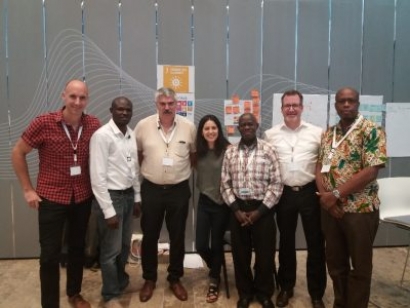
The lab of tomorrow involves businesses in solving development-policy challenges. At its core is the ‘design thinking method’ that multinationals such as Google, Apple and IBM are using to craft new and innovative products.
As one of three teams, "Agali Awamu" was selected to further develop its business model as part of the pilot phase. The idea was formed during the innovation workshop of the lab of tomorrow.
Micro biogas plants have been in operation in Uganda for many years, but due to the relatively high investment cost of around €1,000 ($1,200) is unaffordable for much of the rural population.
Therefore, wood is still used for cooking in rural areas and charcoal is used in urban areas. This contributes to de-forestation which fuels climate change. In addition, the wood collection, which is done almost exclusively by women and girls, can be very time-consuming and sometimes dangerous. Cooking on traditional ovens with firewood is also inefficient and damaging to health.
The group developed a concrete project proposal, the realization of which was subsequently supported by the lab of tomorrow. For this purpose, a biogas plant with a volume of 10m³ was built in a village near the sugar factory Kakira Sugar Limited. For the prototype, five families of the village brought the daily animal manure and household waste to the centrally built biogas plant.
For a fee that is slightly lower than the price of firewood or charcoal, the biogas is put into 1m³ portable containers. The villagers then carry this biogas backpack home and connect it to a gas cooker. The produced biogas is approximately enough to provide a family of five with several warm meals each day.
PlanET Biogas signed a Memorandum of Understanding, agreeing to support the project remotely. For Managing Director Jörg Meyer zu Strohe, the main focus is on opportunities to build commercial biogas plants with power generation in East Africa in the long term through this entry into the market.
The first gas was produced in February 2018 – and the small plant is anticipated to reach full production soon.
Photo: Members of the group "Agali Awamu", lab of tomorrow Uganda (Source: © GIZ / Martin Hangen)

